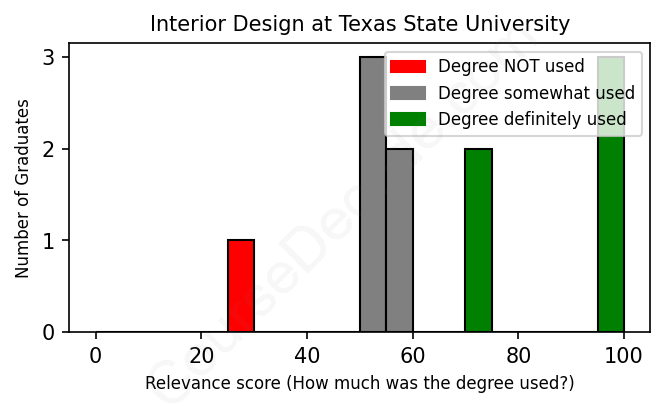
First, some facts. Of the Interior Design graduates from Texas State University we've analyzed , here's how many have used (or NOT used) their degree in their career:

These are estimates based on AI analysis of 11 LinkedIn profiles (see below).
The verdict? On par with the average. Overall, with an average relevance score of 67%, Interior Design graduates from Texas State University have about the same likelihood of finding work in this field as the average graduate across all fields:
And for comparison, here's the chart for all profiles we've looked at across all degrees.
Also, after graduating, only 9% of these graduates have pursued further education other than another Bachelor's degree (such as a Masters degree or other), compared to the average across all profiles of 35%. This suggests a Bachelors degree is enough for most Interior Design graduates, and it's normal to look for work straight after graduation.
See the details:
|
Relevance score: 72% We think this person has gone into a career highly relevant to their degree. We think this person has gone into a career highly relevant to their degree.
DEGREE INFOGraduated in 2023 from Texas State University with a Bachelor of Science in Family & Consumer Sciences in Interior Design. No other secondary education since. JOB HISTORY SINCE GRADUATIONFounder THE JEWELL HOUSE Design Studio Jul 2023 - Present Founder  Envy Chocolate Bar Mar 2024 - Present ABOUTNo information provided. |
The top 10 most common jobs done by the graduates we've analyzed (ranked most common to least) are:
From analyzing various resumes of Texas State University graduates with degrees in Interior Design, it's clear that a lot of them landed roles that are pretty closely aligned with their studies. Many graduates work as interior designers, designers in architectural firms, or hold positions like project coordinators, where they can apply their design skills daily. Roles like Senior Interior Designer, Kitchen Designer, and Project Coordinator clearly benefit from the expertise gained during their degree, allowing them to creatively express their knowledge and make a significant impact in their work environment.
However, there are also several graduates who veered off the design path into roles that don’t really tap into their academic background. For instance, positions in sales, coaching, and teaching, while they may have some overlapping skills like organization or aesthetics, typically don't require the specific knowledge and training that comes with an Interior Design degree. So while many are successfully using their design skills in relevant positions, there’s a noticeable chunk that found themselves in jobs that seem a bit disconnected from their field of study. Overall, it’s a mixed bag—lots of folks are right where they should be, but some have taken a detour that doesn’t make much use of their design education.
Here is a visual representation of the most common words in job titles for Interior Design graduates (this is across all Interior Design graduates we've analyzed, not just those who went to Texas State University):

Graduates from Texas State University's Interior Design program generally take quite a variety of career paths after finishing their degrees. Many of them land their first jobs in relevant roles, with positions like interior designers or design interns at architecture or design firms being common right out of college. It’s great to see that a good number of these graduates kickstart their careers in positions that align closely with their field of study, such as interior designers at specific firms or assistant roles under established designers. This suggests that the program does prepare students well for immediate employment in the industry.
As for what they tend to do five or ten years after graduation, it looks like many of them either continue to rise within design firms or branch out into entrepreneurship. For instance, you can see individuals moving up from intern roles to intermediate or managing designer positions, which is a solid trajectory. Some even take bold steps into starting their own design studios shortly after graduation, which shows a lot of ambition and confidence in their skills. However, there are also a few cases where graduates drift away from traditional interior design roles, finding jobs in teaching or unrelated fields. Overall, while there's some variety in career outcomes, many are finding fulfilling roles that connect back to their degrees, indicating a generally positive trajectory for Texas State alumni in Interior Design.
Getting a Bachelor’s degree in Interior Design, including at Texas State University, can be pretty challenging but also really rewarding. It's not just about picking out pretty colors or arranging furniture; you’ll dive into design principles, space planning, and even some technical stuff like drafting and computer software. The workload can be intense, with projects, critiques, and presentations, so you’ll need to be organized and dedicated. If you’re passionate about design and willing to put in the effort, it can be an awesome experience, but it’s definitely not a walk in the park!
Most commonly, in the LinkedIn profiles we've looked at, it takes people 3 years to finish a Bachelor degree in Interior Design.
Looking at these grads from Texas State University, it seems like they’ve had a pretty solid mix of career paths that could lead to decent financial success. The early grads, like the ones from 2011 and 2012, moved into some high-level positions like CEO and senior interior designer, which typically pay well, especially with that experience under their belts. The more recent grads seem to be climbing the ladder too; some have already taken on managing roles at relatively young ages. Others in different professions, like teaching, might not rake in the big bucks, but they still have stable jobs. Overall, it looks like those who stayed in interior design are on a good track, while others are exploring different avenues, which can be hit or miss money-wise. So yeah, it seems like there's a mix of potential for decent earnings depending on the path they choose!
Here is a visual representation of the most common words seen in the "about" section of LinkedIn profiles who have a Bachelor degree in Interior Design (this is across all Interior Design graduates we've analyzed, not just those who went to Texas State University). This may or may not be useful:

Here are all colleges offering a Bachelor degree in Interior Design (ordered by the average relevance score of their Interior Design graduates, best to worst) where we have analyzed at least 10 of their graduates:
| College | Score | Count |
|---|---|---|
 Fashion Institute of Technology Fashion Institute of Technology
|
93 | 12 |
 University of Nebraska-Lincoln University of Nebraska-Lincoln
|
92 | 16 |
 Kent State University Kent State University
|
90 | 13 |
 Savannah College of Art and Design Savannah College of Art and Design
|
89 | 21 |
 Design Institute of San Diego Design Institute of San Diego
|
89 | 10 |
 Iowa State University Iowa State University
|
86 | 13 |
 Pratt Institute Pratt Institute
|
83 | 11 |
 Cazenovia College Cazenovia College
|
79 | 15 |
 Purdue University Purdue University
|
74 | 11 |
 The Art Institutes The Art Institutes
|
74 | 20 |
 San Francisco State University San Francisco State University
|
73 | 10 |
 East Carolina University East Carolina University
|
70 | 10 |
 Harrington College of Design Harrington College of Design
|
70 | 14 |
 Texas State University Texas State University
|
67 | 11 |
 Radford University Radford University
|
47 | 10 |